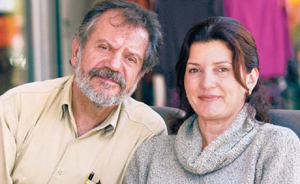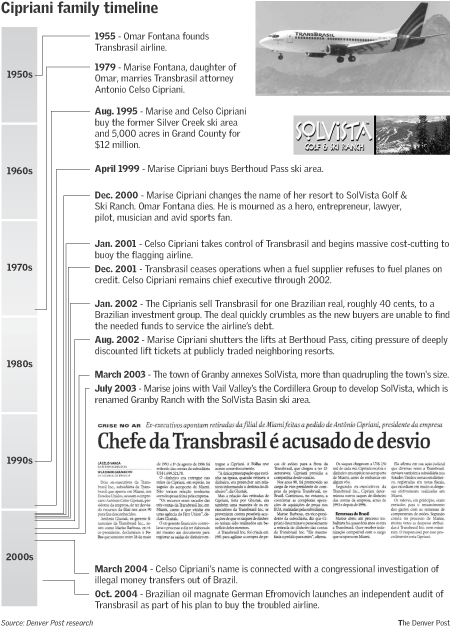Article Published:
Sunday, October 31, 2004
Brazil troubles no carnival
Granby developer Marise Cipriani and her husband weather accusations that he
looted millions from the family's Transbrasil airline. They say the facts will
bear out his innocence.
By Jason Blevins
Denver Post Staff Writer
| In Colorado,
Marise Cipriani has spent the past nine years sculpting a 5,000-acre playground
with skiing, golf and homes at Granby Ranch, 90 miles northwest of Denver.
A soft-spoken and agile businesswoman, she has won admirers in Grand County
and within Colorado's ski industry.
A hemisphere away in her home country of Brazil, life is tumultuous.
Her husband of 25 years, Antonio Celso Cipriani, is shepherding the sale
of her family's broken airline, Transbrasil, while facing accusations
that he looted the company of millions of dollars.
Celso Cipriani also faces government-led
investigations into allegations of illegal money transfers. |
 |
Post / Lyn Alweis
Antonio and Marise Cipriani, who have a home in Boulder, deny accusations
of financial wrongdoing against him in their native Brazil, saying the São
Paulo newspapers “have tried to destroy us.” |
No charges have been lodged.
The Ciprianis passionately deny everything.
They blame fired Transbrasil employees and a Brazilian press obsessed with the
family's connections to high-ranking politicians.
A recent audit launched by a potential
buyer of Transbrasil will prove all the allegations false, they said.
Marise Cipriani, 47, called the last
four years the most painful of her life.
"I won't bring my children to
Brazil anymore," she said recently, sitting with her husband in a coffee
shop near their home in Boulder, soon after returning from Brazil on a red-eye
flight.
The Ciprianis openly discussed the
trouble in Brazil. But they view it as a distraction - both to their Granby
Ranch development and to their pending deal to sell Transbrasil.
"Eventually, the truth will
be known," she said.
Marise's father, the late Omar Fontana,
founded Transbrasil in 1955 as a way to ferry his father's processed livestock
from rural ranches to market in So Paolo, South America's largest city.
Today, the Ciprianis are part owners
of one of the largest meatpacking operations in South America.
Their once-vibrant airline has not
been so successful.
In 1995, the Ciprianis said they
would like to fly vacationers on Transbrasil from South America to Colorado.
For various reasons, it never happened.
Today, Transbrasil is idled, its
last three planes grounded since December 2001 when Royal Dutch/Shell refused
to provide fuel without a cash payment.
General Electric Capital, which leased
several planes to the airline, is suing Transbrasil, urging a Brazilian court
to declare the company bankrupt so it can collect delayed lease and maintenance
payments.
Several Brazilian airlines owe millions
of dollars to GE Capital, which declined to comment, citing pending litigation.
The airline industry in Brazil has
nearly collapsed, with the country's largest carriers - Rio Sul, Tam, Varig
and VASP - crippled by debt and pleading with the Brazilian government for help.
"It is a very, very tough environment
for airlines down there," said Michael Boyd, an Evergreen airline consultant.
"They have similar problems to our airlines. But they don't have a network
of closely linked cities. It is such a huge country with population centers
so dispersed, and you have to depend on international traffic coming and going
to make profitability work."
Former employees of Transbrasil,
led by the company's former assessor, are seeking wages they say the company
owes them.
A Brazilian businessman who unsuccessfully
attempted to acquire the airline in early 2001 is suing Celso Cipriani over
the collapsed sale. The government agency that regulates air traffic in Brazil,
Infraero, is seeking back rent for airport terminal gates the airline once occupied.
The airline owes more than 1 billion Brazilian real, or about $350 million.
Celso Cipriani, 58, who serves on
Transbrasil's board and was its president from 2000 to 2002, is lobbying the
Brazilian government for credits he says the government owes but will not provide.
The newspapers in So Paolo have written
more than a dozen articles accusing him of secreting millions out of Transbrasil
and into foreign bank accounts.
"They tried to create a monster
out of my husband," Marise Cipriani says, her eyes welling with tears.
"The reporters there have tried to destroy us. They put whatever they want
in the paper. It changes almost every day."
Arrived in Grand County in
1995
The couple paid $12 million for the
Silver Creek ski area, which had languished in bankruptcy court after its owners
died in a plane crash.
Marise and Celso Cipriani arrived
in Grand County in 1995.
The couple owned vacation property
in Beaver Creek when they first visited the Silver Creek ski area, which had
languished in bankruptcy court for eight years. The resort's early owners, Bud
Goette and Kelly Clanke, were killed in a plane crash at an airport adjacent
to the ranch in 1986.
The Ciprianis bought the ski area
and surrounding land for $12 million and later renamed it SolVista. Now, the
ski area is known as Granby Ranch with the SolVista Basin ski area.
By 2000, Marise Cipriani had drafted
a $600 million plan for their new holding. She saw golf courses winding between
homes - and less emphasis on the 400-acre ski area. She envisioned a holistic
learning center, a medical campus and clusters of communities. She planned a
four-season resort that would be more home than vacation playground. She sold
off lots inside the 5,000-acre ranch to pay for the development and make payments
on the $11.5 million she borrowed to buy it.
She currently sits on the board of
Colorado Ski Country, the marketing group that promotes the state's ski resorts.
She serves alongside some resort chiefs whom she once criticized for pricing
season passes so low they crimp smaller resorts like hers.
Two years ago, the Ciprianis enlisted
Gerry Engle and his Cordillera Group as a partner in the development of Granby
Ranch.
Engle created one of the first upscale
golf communities in the Vail Valley and has helped Marise Cipriani craft small
neighborhoods - called "camps" - that reflect the feel of a rural
town within the resort.
"Integrity, commitment, passion,"
said Engle. "They are everywhere around her. Even the people she has to
stand up to respect her."
Money-laundering, fraud investigations
A newspaper says Celso Cipriani illegally
sent millions out of Brazil, and a federal attorney is probing bankruptcy-fraud
allegations.
In Brazil, some news reports say
Celso Cipriani plundered from the airline. One paper, citing a police document
released in 2003, accused him of illegally sending $35 million out of the country
using a New York firm, Beacon Hill Service Co.
In a statement he provided in June
to a congressional panel investigating the alleged money-laundering schemes
in Brazil, Cipriani said he had never heard of Beacon Hill until he read of
his company's alleged connection with it in a May 2002 newspaper article.
The Brazilian federal attorney also
is investigating charges of bankruptcy fraud against Celso Cipriani, said Brazilian
Sen. Antero Paes de Barros in a statement to The Denver Post.
"The Brazilian Congress Investigation
Committee subpoenaed Mr. Cipriani to testify on money transfers he ordered to
financial institutions outside Brazil," de Barros said, noting that Cipriani's
formal testimony is pending.
Before taking any action, the congressional
committee must conclude its analysis of the Ciprianis' bank accounts in Brazil
and the United States, said de Barros, who is chairman of the congressional
committee.
Despite a lack of charges, newspapers
in So Paolo persist in what Celso Cipriani calls a "personal libel campaign
... reheated whenever it is convenient to the illegitimate interests of third
parties."
In his statement to the congressional
panel in June, he said the press reports accusing him of stealing from Transbrasil
are orchestrated by competing airlines eager to see Transbrasil fail.
The Ciprianis also point
to several former employees .
Celso Cipriani whittled Transbrasil's
workforce from 4,000 to fewer than 1,800 between 2001 and 2002. Some of those
dismissed employees are behind the newspaper reports, he said.
The most recent reports in the papers
have connected Celso Cipriani with a countrywide investigation involving Brazilian
bank Banestado and an alleged money-laundering scheme that has ferried a reported
$30 billion out of Brazil and into foreign banks.
The investigation is headed by a
special congressional panel exploring the country's largest banks and special
accounts known as CC-5 accounts, which are legal but can make it easier to ship
money out of the country.
Last month, newspapers in So Paolo
reported a leaked list of bank transactions connected to the investigation.
Celso Cipriani's name was on the list.
The Ciprianis shake their heads when
asked about it. Yes, they used the bank in 2001 to change some of her family's
stocks and investments into dollars. But it was a little more than $2 million,
they said. Some of that went to Granby Ranch to kick-start some development
projects, and some of the stocks were posted as collateral to help pay Transbrasil
employees.
"They have accused me of taking
money from Transbrasil, but in fact it is the exact opposite," Celso Cipriani
said. "We collateralized our stocks and put money into Transbrasil."
Brazilian oil tycoon bidding
for airline
The magnate, who is currently sizing
up the company, envisions using Transbrasil's remaining three planes as cargo
carriers.
Celso Cipriani has sued 14 people
connected to one newspaper story and won judgments against two sources involved.
Meanwhile, a Brazilian oil magnate,
German Efromovich, plans to buy Transbrasil for an undisclosed sum.
He intends to use the company's remaining
three planes as cargo carriers. Last week, Efromovich launched an independent
audit of the airline. The Ciprianis said the results of that audit, expected
in the next month, will quash allegations that Celso Cipriani plundered the
airline's coffers.
Two years ago, the Ciprianis tried
to sell the company to a buyer for just one Brazilian real and have the buyer
assume the airline's growing debt. That sale crumbled.
This time, Efromovich, who also is
reportedly in the process of acquiring a bankrupt airline in Colombia, has studied
the company's finances and would not buy a company with millions of dollars
missing, Celso Cipriani said.
Staff writer Jason Blevins can be
reached at 303-820-1374 or jblevins@denverpost.com .

DenverPost

